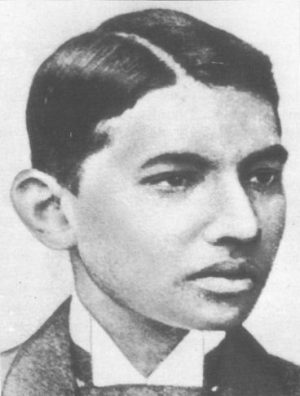Mahatma Gandhi is known all over the world as the anti-colonial nationalist who used nonviolent protests to lead India to its independence. His nonviolent resistance influenced global leaders worldwide and changed the course of world history. However, as great as he is in the annals of history, Gandhi started out from humble beginnings.
Primary Education
Gandhi attended the local school in his hometown at age nine. This is where he studied basic mathematics, the Gujarati language, history, and geography. He was not a remarkable student in any way, was shy, and was not good at physical activities either.
High School Education
After completing his primary education, Gandhi entered Alfred High School at age 11. He remained a mediocre student but seemed to have an aptitude for English. However, he did not seem to have performed well in geography. His shyness and timidity still hounded him, but otherwise, he was a well-behaved student. His handwriting remained terribly illegible, and scholars believe that this is because Gandhi originally learned to write on dust with his fingers. At age 13, he was married to a girl of the same age, and it was also around this time that his father fell ill. After India attained its independence in 1947, Alfred High School was renamed Mohandas Gandhi High School. The school stopped its operations in 2017 and was turned into a museum.
College Education
In 1888, at the age of 18, Gandhi entered Samaldas College in Bhavnagar but soon dropped out. His father died in 1885, and his relatives decided that he should go to England to study law and follow in his father’s footsteps by being a local official. Gandhi’s mother objected to the idea, worried that her son’s morals would be tainted by life in England. In response, Gandhi assured his mother that he would stay away from meat, wine, and other women. His mother finally relented, but senior members of Gandhi’s caste opposed the plan. They stated that they would not allow England to taint the morals of one of their members and threatened to expel Gandhi from their cast. Gandhi disregarded these threats and went on to sail to England.
Law Studies
Gandhi studied law and jurisprudence at University College London. He still suffered from shyness, but he tried his best to fit in by dressing up as a typical English gentleman. He also took dancing and speech lessons. One of the activities that Gandhi enjoyed in London was his work as part of the London Vegetarian Society. He became influenced by vegetarianism by the writings of Henry Stephens Salt, and so he found it easy to keep his promises to his mother. He participated in the London Vegetarian Society’s meetings and wrote articles for its journal. Gandhi frequented vegetarian restaurants in London, and there he met several theosophists and socialists. During his studies with his theosophist friends, he discovered the beauty of the Bhagavad Gita and the Christian Bible. After three years of studying, Gandhi graduated from University College London and went home to India. He was greeted with the heartbreaking news that his mother had died while he was away.
Education as an Activist in South Africa
Gandhi was not able to achieve success as a law practitioner in India. However, in 1893, the owner of a shipping enterprise informed Gandhi that his cousin in Johannesburg needed a lawyer. Gandhi agreed to take on the job, and soon he arrived in South Africa. He thought that he would be treated there as a British citizen, but instead, he experienced all kinds of discrimination, including being thrown out of a train and being ordered to remove his turban inside a magistrate’s court. Gandhi learned to accept the harsh reality of being an Indian in South Africa, but he developed inner strength and became a political activist for the rights of Indians. In 1915, after 20 years in South Africa, Gandhi went home to India, enjoying the reputation of a great soul.
His experiences in South Africa convinced him that education is a potent weapon that can transform Indian society. He then promoted the idea that education should concentrate on the building of people’s characters and moral convictions. He stated that education should be free and available to everyone regardless of social class. Gandhi’s education in school and in life led him to educate the younger generation. In Balpothi, Gandhi’s textbook for children, he teaches that boys and girls are both responsible for household work, like washing clothes and cooking. The idea that only women should work around the house was opposed by Gandhi. Through his teachings in this book, the idea of women’s fight for gender equality was given awareness. Learning from India’s suffering under the British Empire, he urged schools to teach handicrafts to students. This way, he hoped that India would attain self-sufficiency in the manufacturing industry.
